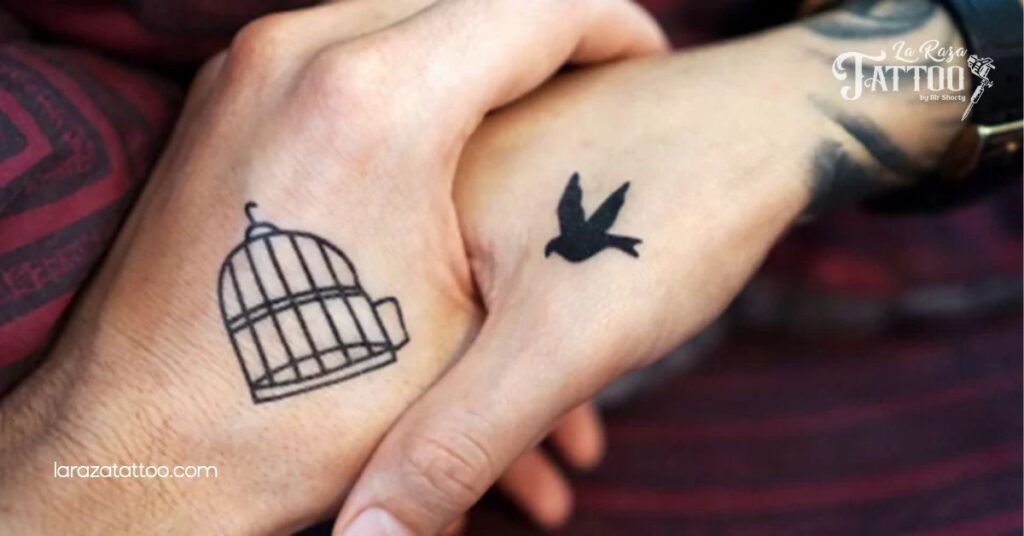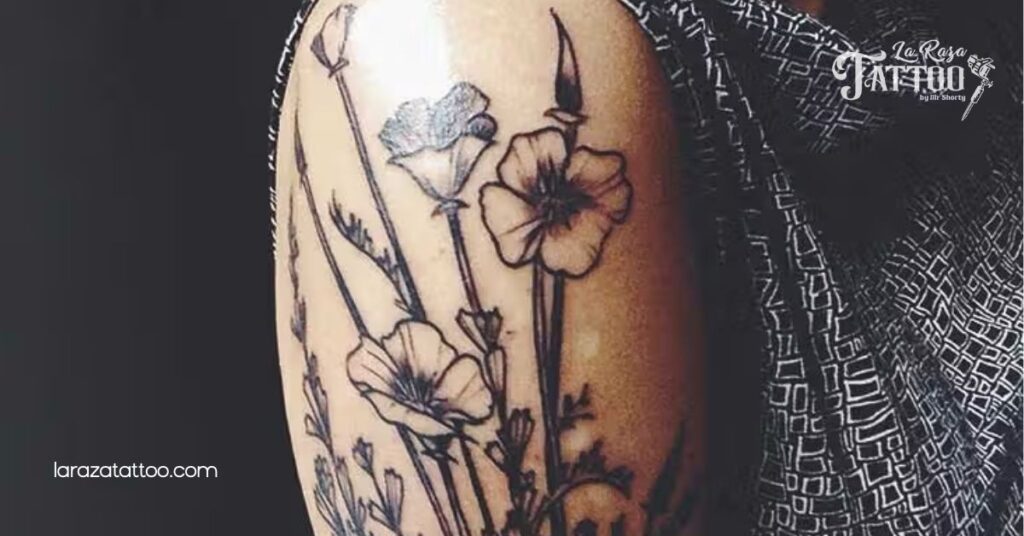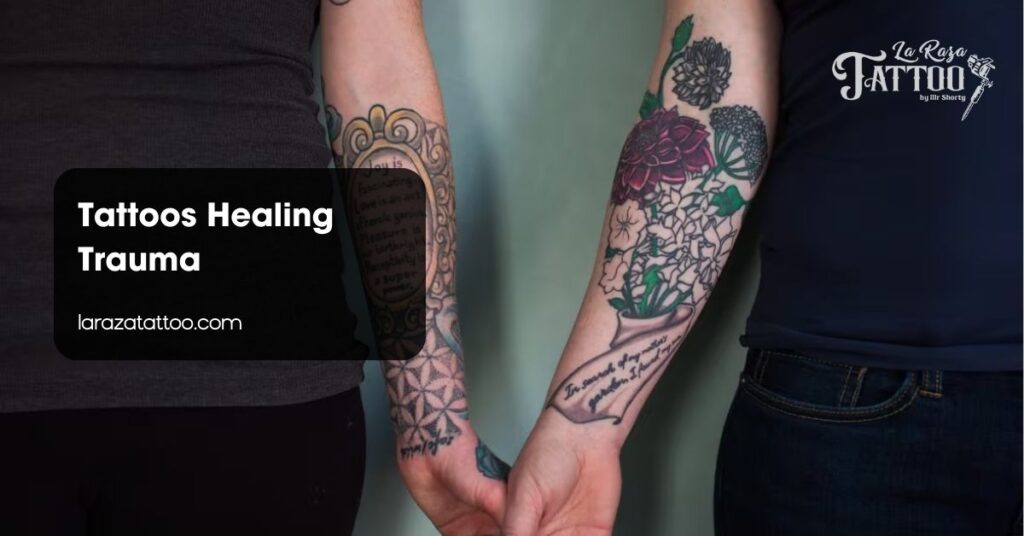Tattoos have long been more than just body art; they can serve as powerful symbols of healing and transformation. If you’ve ever felt the weight of trauma, you know how deeply it can affect your life. Imagine turning that pain into something beautiful and meaningful. Tattoos can be a way to reclaim your story and express your journey toward healing.
In a industry where self-expression is vital, tattoos offer a unique avenue for empowerment. They allow you to wear your scars proudly, transforming them into art that tells your story. Whether it’s a tribute to a lost loved one or a mark of personal resilience, tattoos can help you redefine your relationship with trauma. Discover how this form of body art can not only beautify but also heal, giving you the strength to move forward.
Understanding Tattoos Healing Trauma

Tattoos serve as powerful tools for healing emotional wounds. These marks on the skin can help people navigate their journeys through trauma and reclaim their narratives.
Definition of Trauma in Relation to Tattoos
Trauma often refers to deeply distressing experiences that significantly impact a person’s mental and emotional well-being. You may find that events such as accidents, loss, or abuse leave lasting scars, both visible and invisible. Tattoos can symbolize transformation, representing the shift from pain to empowerment. By choosing exact designs, you can communicate your story and create a daily reminder of strength and resilience.
Historical Context of Tattoos in Healing
Throughout history, various cultures have utilized tattoos for healing. Ancient practices reveal that tattoos often served as protective symbols or rites of passage. Traditional societies would mark their skin as a way to connect with their heritage, often to commemorate healing from trauma. You might notice that modern interpretations link the history of tattoos with personal recovery. Many individuals still find solace in using tattoos as a means to honor their experiences, illustrating an age-old tradition of turning suffering into artful expressions of survival.
The Psychological Benefits of Tattoos Healing Trauma

Tattoos can offer profound psychological benefits, especially for those handling trauma. They help in the journey of healing by enabling personal empowerment and emotional expression.
Empowerment Through Body Art
You gain a sense of control when you choose to get a tattoo. For many, this act of decision-making serves as a reclamation of autonomy over their bodies, particularly after experiences of abuse. Each tattoo can symbolize strength and resilience, transforming your pain into meaningful art. As you wear these symbols, you’re actively asserting your identity and choosing how to represent your journey. Research shows that this empowerment can amplify self-esteem, giving you confidence in your healing process.
Expressing Emotions and Experiences
Tattoos allow for expressive storytelling, turning your emotions into visible art. You can process traumatic events through imagery that resonates deeply with you. Many individuals use tattoos as a method to externalize feelings they might struggle to articulate. For instance, survivors of trauma often select designs that hold important meaning, helping to narrate their experiences vividly. By showcasing your emotional journey, tattoos not only aid in healing but create a permanent reminder of your growth and resilience.
Personal Stories of Tattoos Healing Trauma
Many individuals turn to tattoos as a means to reclaim their narratives and heal from trauma. Let’s explore some real-life testimonials that highlight the groundbreaking power of body art.
Testimonials from Individuals

Survivors often share how their tattoos have become symbols of resilience. One woman expressed that after experiencing trauma, the act of getting a tattoo allowed her to assert her identity and shift her focus from pain to empowerment. Another veteran shared that tattoos became a important part of his emotional relief coping strategy. He reported feeling a sense of freedom once he could externalize his inner battles through ink.
Many others have reported similar experiences. A young man highlighted how each tattoo serves as a tribute to his journey, allowing him to transform his scars into stories he’s proud to share. From reclaiming lost narratives to embodying triumph over adversity, these personal stories reflect the deep emotional connections people forge with their tattoos.
Highlighting Groundbreaking Experiences

Tattoos can symbolize more than just art; they often represent profound transformations in individuals’ lives. A woman, after a long struggle with personal trauma, described getting a tattoo as a pivotal moment for her healing journey. The design was chosen purposefully, embodying her strength and shifting focus from victim to survivor.
For many combat soldiers, tattoos serve as a therapeutic release from the burdens they carry. One soldier revealed how a tattoo helped him express feelings tied to distressing memories, providing both relief and a sense of camaraderie with fellow service members. Each tattoo becomes a collective reminder of shared experiences, enabling healing through connection.
As you can see, these personal stories illuminate the powerful role tattoos play in healing trauma. By transforming pain into meaningful art, individuals can reclaim control over their narratives and take pride in their journeys toward recovery.
The Art of Choosing the Right Tattoo for Healing

Choosing a tattoo for healing is a personal journey that can deeply impact your life. It’s important to consider the symbolism and meaning behind each design you contemplate.
Selecting Symbolism and Meaning
Consider personal narratives and symbols that resonate with you. Tattoos are a powerful form of self-expression, allowing you to convey your unique stories and emotions. Symbols like shattered glass and broken chains may represent overcoming pain, while a phoenix rising from ashes often signifies rebirth and resilience.
Think about the cultural significance a tattoo can hold. Many Indigenous cultures use tattooing for healing and to reconnect with their cultural identity. Incorporating such symbols can add profound depth to your tattoo, making it a meaningful representation of not just your journey, but also your heritage.
Don’t overlook the role of color psychology in your design choice. Colors can influence emotions and perceptions, so selecting the right hues can enhance the therapeutic effect of your tattoo. Warm colors might evoke feelings of comfort while cool colors may promote calmness and tranquility.
Working with a Tattoo Artist for Therapeutic Designs
Find a tattoo artist who understands the healing aspect of tattooing. You want someone who can translate your ideas into designs that reflect your journey. Openly discuss your vision and emotions with them, as this collaboration can amplify the meaning behind your tattoo.
Schedule a consultation to express your concepts and explore different possibilities. Artists often provide invaluable insights and suggestions, helping you refine your design to align perfectly with your emotional healing process.
Be open to recommendations on design elements and styles. An experienced artist might suggest approaches that resonate with your healing journey, making the process feel more rewarding and personal.
Trust your instincts throughout the selection process. Captivating in this journey allows you to reclaim your narrative, transform your pain into beauty, and eventually embrace your healing path.
Aftercare and Its Role in Tattoos Healing Trauma

Caring for your new tattoo is crucial not only for the body’s healing but also for your emotional well-being. Proper aftercare enhances the healing process, ensuring the tattoo remains vibrant and meaningful while supporting your journey through trauma.
Importance of Proper Tattoo Aftercare
Ensuring you take care of your tattoo is vital for both physical and psychological healing. It helps prevent infections and promotes faster recovery, allowing the artwork to reflect your narrative without complications. Following aftercare instructions, like keeping the area clean and moisturized, allows your skin to heal, creating a lasting representation of resilience. Taking these steps reassures you that your tattoo can serve as a constant reminder of your strength and growth.
Psychological Aftercare Support
Support doesn’t stop at physical care; psychological aftercare is equally important. Captivating with supportive communities can provide emotional boost during the healing process. Talking about your experience with trusted friends or loved ones can help you process feelings associated with trauma. Knowing that others understand your journey offers comfort and validation, reinforcing your personal narrative. Seeking professional help through therapy, if needed, can further support your emotional journey after getting tattooed. Each conversation contributes to a deeper understanding of yourself, transforming the experience into a powerful tool for healing.
Moving Forward: The Journey Beyond Tattoos Healing Trauma

Tattoos can be a powerful part of your journey toward healing and personal growth. Embracing this art form may lead to greater self-awareness and a newfound appreciation for your story.
Integrating Tattoos into Personal Growth
Incorporating tattoos into your personal growth journey allows you to symbolize transformation. You might choose designs that resonate with pivotal experiences, making those moments more tangible. Art can become a visual affirmation of your resilience, reminding you of your strength during tough times. Connecting with your tattoo’s meaning deepens your emotional healing, turning scars into symbols of growth. Exploring the creative process with your tattoo artist can further enhance this experience, as collaboration fosters a sense of ownership over your narrative. Captivating in this personal journey can also inspire others, showing that healing is possible. You’ll discover how your body art adds layers to your identity, reflecting the evolution of your spirit.
Understanding Long-term Effects on Mental Health
Gaining insights into the long-term effects of tattoos on mental health is essential for sustaining your healing journey. For many, the act of getting a tattoo can lead to lasting emotional relief, enabling you to process trauma more effectively. Cultivating a positive mindset around your tattoos can reinforce their role as markers of resilience and empowerment. Establishing supportive relationships within communities can amplify this positive impact, as sharing experiences with others can promote healing. Also, acknowledging any residual feelings about your past can help integrate your tattoos into a broader narrative of recovery. Nurturing self-love and acceptance through body art contributes to ongoing mental well-being. By prioritizing open discussions about your tattoos and experiences, you can enhance your emotional industry, creating a more profound connection with your personal growth journey.
Conclusion
Tattoos can be much more than ink on skin; they’re powerful symbols of healing and transformation. By embracing your scars and turning them into art, you reclaim your narrative and celebrate your journey. Each tattoo represents a step toward empowerment and resilience, allowing you to express your unique story.
As you consider your own tattoo journey, remember the importance of choosing designs that resonate deeply with your experiences. This personal connection can enhance your healing process and foster greater self-awareness. Captivating in supportive communities and prioritizing aftercare will further enrich this groundbreaking experience, ensuring your tattoos remain vibrant reminders of your strength and growth. Embrace the journey and let your body art reflect the beauty of your resilience.
Frequently Asked Questions
What is the significance of tattoos in healing trauma?
Tattoos serve as powerful symbols of healing and transformation. They help individuals reclaim their stories and express their journeys, turning pain into meaningful art. Whether as tributes to loved ones or marks of personal resilience, tattoos empower people to wear their scars proudly.
How do tattoos help in reclaiming personal narratives?
By choosing a tattoo that reflects their experiences, individuals can take control of their narratives. Each tattoo can symbolize strength and resilience, allowing people to process and externalize emotions, transforming pain into a permanent reminder of personal growth.
What historical context do tattoos have related to healing?
Throughout history, various cultures have used tattoos as protective symbols or rites of passage. This tradition continues today, as many find solace in tattoos that honor their experiences, illustrating the enduring practice of turning suffering into artful expressions.
How can someone choose the right tattoo for healing?
Choosing the right tattoo is a personal journey. Individuals should consider the symbolism and meaning behind their designs, reflecting on personal narratives and cultural significance. Collaborating with a tattoo artist who understands the healing aspect can help create designs that resonate deeply.
Why is aftercare important for tattoos?
Proper aftercare is crucial for both physical healing and emotional well-being. It helps prevent infections and promotes faster recovery, ensuring the tattoo remains a vibrant representation of resilience. Psychological aftercare support is also essential for navigating trauma.
What are the long-term effects of tattoos on mental health?
Tattoos can provide lasting emotional relief and reinforce resilience over time. They symbolize transformation and foster greater self-awareness. Establishing supportive relationships and nurturing self-love through body art are vital for ongoing mental well-being and personal growth.
Can tattoos be a part of personal growth?
Yes, tattoos can symbolize transformation and personal growth. By choosing designs that resonate with pivotal experiences, individuals turn scars into symbols of resilience. The creative process with a tattoo artist can deepen emotional healing and ownership of one’s narrative.






